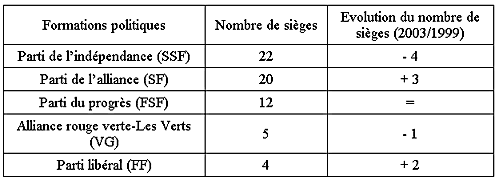Results
News
Corinne Deloy,
Fondation Robert Schuman,
Helen Levy
-

Available versions :
EN

Corinne Deloy
Fondation Robert Schuman
Helen Levy
The government coalition maintained its majority in the Icelandic general elections on 10th May. With 34 seats the Independence Party (SSF) and the Progress Party (FSF) still hold between them the absolute majority in the Althing, the single Chamber in the Icelandic parliament. However the Independence Party, the Prime Minister's movement, lost four seats, placing Prime Minister David Oddsson in a difficult position in terms of forming the next government. As soon as the results were announced speculation started as to the composition of the new government team. "It will be difficult to form a government", declared Halldor Asgrimsson, Foreign Affairs Minister in the outgoing government coalition and leader of the Progress Party (FSF) who can only rejoice at his movement's results, maintaining 12 seats in Parliament and becoming the inevitable partner in the creation of the next government. On election evening some political analysts half suggested that Halldor Asgrimsson might have his sights on becoming the next Prime Minister. The possibility of a coalition combining the Progress Party and the Alliance Party was also foreseen by the members of the Liberal Party. Finally others maintain that David Oddsson might maintain his position as Prime Minister and hand over power to his Foreign Affairs Minister before the end of his mandate.
The Alliance Party, the main opposition party, recorded a win of three additional seats in comparison with the last elections in 1999. However its candidate for the post of Prime Minister, the former mayor of Reykjavik Ingibjörg Solrun Gisladottir, who was fifth on her party's list in an area of the capital did not manage to make her entry into Parliament, a failure that would not stop her acceding to the post of head of government, since Icelandic electoral law does not make it obligatory for the Prime Minister to be a member of Parliament. The Social Democrat movement did not reach the objective that its leader Ossur Skarphendinsson had set it, i.e. "to become Iceland's leading party" at the end of these general elections. The Alliance Party did managed to win through however in the capital of Reykjavik, David Oddsson's stronghold.
As far as the small parties are concerned the Ecologist party (VG) lost one seat in comparison with the last general elections in 1999 and the Liberal Party (FF) won two. This little party made a break through in the last opinion polls by promoting the reform of the fishing quota system. We should finally take note that these general elections really did interest the Icelanders: 87.8% of them turned out to vote, a participation rate that was 3.7 points higher than the general elections on 8th May 1999.
David Oddsson, who was accused of leading a dull campaign that was light years away from the electorate's preoccupations said he was disappointed by his movement's performance. The Prime Minister's programme focussed on revenue tax cuts, cuts on the amount of VAT on basic foodstuffs and it also aimed in the mid-term to do away with property tax. This programme was estimated at a cost of 60 million euros. The Independence Party's leader also promised to maintain high growth rates, (3-4%) over the next five years, the control of inflation and low unemployment rates. "This means seeing if the electorate still wants to continue in this safe direction that we have chosen to follow already or if they want to run the risk of a government with three or four parties making their usual mistakes with the economy", he declared on 8th May last.
The Alliance Party for its part focussed its campaign on the continuing inequalities between the rich and the poor believing that around 15,000 are being left behind by the liberal system in Iceland, and the defence of the social protection system, that has also been neglected by the liberals.. Ingibjörg Solrun Gisladottir equally denounced the current fishing quota system that she believes favours those in power and ruins the small fishermen on the coast, who are condemned to rural exodus. She also defended women pointing out that in 1994 Iceland had a woman President of the Republic, a woman at the head of Parliament, a woman president of the Supreme Court and a female mayor of the country's capital. (Ingibjörg Solrun Gisladottir herself). The last few days of the campaign revealed increasing tension between the country's two main political parties with the Prime Minister declaring that voting for the opposition "would be like allowing your children to play with matches" and Ingibjörg Solrun Gisladottir presenting David Oddsson as a worn out head of government whom it was necessary to replace.
Negotiations, that have already started between the different political movements, will decide upon the name of the future head of the Icelandic government. David Oddson, who is a novelist said that he would like to start writing again. The leader of the Independence Party should however, for the fourth time running, take up his seat as Prime Minister and by leading his fourth term of office to its end, he might equal Helmut Kohl's record of longevity of sixteen years at the head of the German government.
Results of general elections on 10th May 2003 :
Participation : 87.8%
 Source: Agence France Presse
Source: Agence France PresseOn the same theme
To go further
Elections in Europe
Corinne Deloy
—
4 November 2025
Elections in Europe
Corinne Deloy
—
28 October 2025
Elections in Europe
Corinne Deloy
—
14 October 2025
Elections in Europe
Corinne Deloy
—
7 October 2025

The Letter
Schuman
European news of the week
Unique in its genre, with its 200,000 subscribers and its editions in 6 languages (French, English, German, Spanish, Polish and Ukrainian), it has brought to you, for 15 years, a summary of European news, more needed now than ever
Versions :



